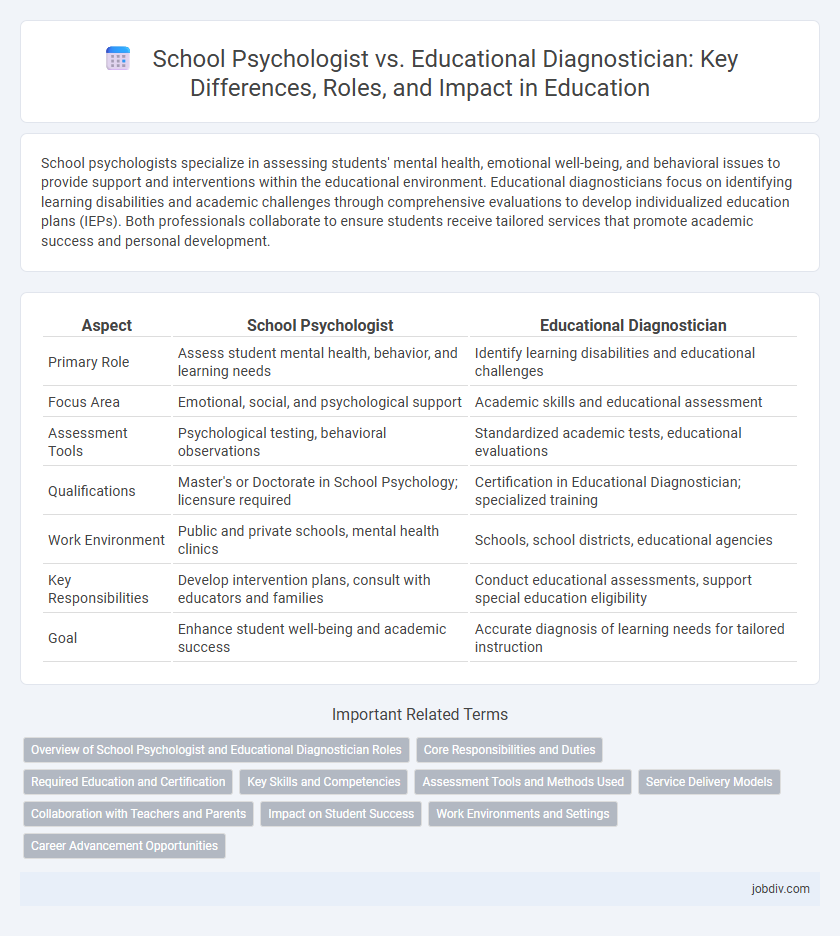School psychologists specialize in assessing students' mental health, emotional well-being, and behavioral issues to provide support and interventions within the educational environment. Educational diagnosticians focus on identifying learning disabilities and academic challenges through comprehensive evaluations to develop individualized education plans (IEPs). Both professionals collaborate to ensure students receive tailored services that promote academic success and personal development.
Table of Comparison
| Aspect | School Psychologist | Educational Diagnostician |
|---|---|---|
| Primary Role | Assess student mental health, behavior, and learning needs | Identify learning disabilities and educational challenges |
| Focus Area | Emotional, social, and psychological support | Academic skills and educational assessment |
| Assessment Tools | Psychological testing, behavioral observations | Standardized academic tests, educational evaluations |
| Qualifications | Master's or Doctorate in School Psychology; licensure required | Certification in Educational Diagnostician; specialized training |
| Work Environment | Public and private schools, mental health clinics | Schools, school districts, educational agencies |
| Key Responsibilities | Develop intervention plans, consult with educators and families | Conduct educational assessments, support special education eligibility |
| Goal | Enhance student well-being and academic success | Accurate diagnosis of learning needs for tailored instruction |
Overview of School Psychologist and Educational Diagnostician Roles
School Psychologists specialize in analyzing student behavior, emotional well-being, and learning challenges to develop interventions that support academic success and mental health. Educational Diagnosticians focus primarily on assessing learning disabilities and educational needs through standardized testing and data interpretation to guide individualized education plans (IEPs). Both roles collaborate with educators and families to create supportive learning environments but differ in their core assessment techniques and intervention strategies.
Core Responsibilities and Duties
School psychologists assess student behavior and mental health, develop intervention plans, and collaborate with teachers and parents to support emotional and academic success. Educational diagnosticians specialize in evaluating learning difficulties, administering psychoeducational tests, and interpreting data to guide individualized education programs (IEPs). Both roles are essential in identifying student needs, but school psychologists focus more on mental health, while educational diagnosticians emphasize academic evaluation.
Required Education and Certification
School psychologists typically require a specialist-level degree such as an Ed.S. or Psy.S., along with state licensure and National Association of School Psychologists (NASP) certification. Educational diagnosticians often hold a master's degree in special education or educational diagnosis and must obtain state certification specific to educational diagnosis and assessment. Both roles demand rigorous training in psychological and educational assessment, but certification and educational requirements vary by state and professional standards.
Key Skills and Competencies
School psychologists excel in behavioral assessment, counseling, and crisis intervention, effectively supporting students' mental health and emotional well-being. Educational diagnosticians specialize in evaluating learning disabilities, conducting psychoeducational assessments, and interpreting data to inform individualized education plans (IEPs). Both roles require strong analytical skills, knowledge of educational law, and proficiency in collaboration with teachers, parents, and multidisciplinary teams.
Assessment Tools and Methods Used
School psychologists utilize a wide array of assessment tools including cognitive, behavioral, and emotional evaluations to identify student needs and guide interventions, employing instruments like the WISC-V and BASC-3. Educational diagnosticians focus primarily on academic achievement and learning disabilities, using standardized achievement tests such as the Woodcock-Johnson IV and curriculum-based measurements to inform instructional planning. Both professionals collaborate to interpret data and support individualized education programs (IEPs) through specialized assessment methodologies tailored to student profiles.
Service Delivery Models
School psychologists utilize a multidisciplinary service delivery model that integrates direct counseling, behavioral interventions, and psychoeducational assessments to support students' mental health and academic performance. Educational diagnosticians primarily focus on comprehensive educational evaluations using standardized testing, collaborating with educators to develop individualized education programs (IEPs) that tailor academic instruction. Both professionals work within response-to-intervention (RTI) frameworks but differ in their scope, with school psychologists addressing emotional and behavioral needs while educational diagnosticians concentrate on specific learning disabilities and instructional planning.
Collaboration with Teachers and Parents
School psychologists collaborate closely with teachers and parents to assess students' emotional, behavioral, and learning needs, providing tailored interventions and support strategies. Educational diagnosticians work primarily with teachers to evaluate and diagnose learning disabilities, ensuring accurate identification and appropriate educational planning. Both professionals facilitate communication between educators and families to promote student success through shared goals and evidence-based practices.
Impact on Student Success
School psychologists utilize psychological assessments and counseling techniques to address students' emotional and behavioral challenges, directly promoting mental health and academic achievement. Educational diagnosticians specialize in identifying learning disabilities through comprehensive evaluations, enabling targeted instructional strategies and interventions that support individualized learning needs. Together, their roles significantly enhance student success by creating supportive educational environments tailored to diverse cognitive and emotional profiles.
Work Environments and Settings
School psychologists primarily work in K-12 public and private school settings, collaborating with teachers, parents, and administrators to address student mental health, behavioral, and academic challenges. Educational diagnosticians often operate within school districts or specialized assessment centers, focusing on evaluating students' learning disabilities and developmental delays through standardized testing and data analysis. Both professionals may also engage in community agencies or clinics but differ in their emphasis, with school psychologists providing counseling and support services while educational diagnosticians specialize in formal assessment and eligibility determination.
Career Advancement Opportunities
School psychologists often have broader career advancement opportunities in clinical and counseling roles within educational settings, whereas educational diagnosticians specialize in assessment and evaluation, with potential growth in specialized testing and individualized education program (IEP) development. School psychologists may advance into administrative or leadership positions, such as director of school psychology services or mental health coordinator. Educational diagnosticians typically progress by gaining expertise in diverse assessment tools and contributing to policy development or special education program design.
School Psychologist vs Educational Diagnostician Infographic

 jobdiv.com
jobdiv.com